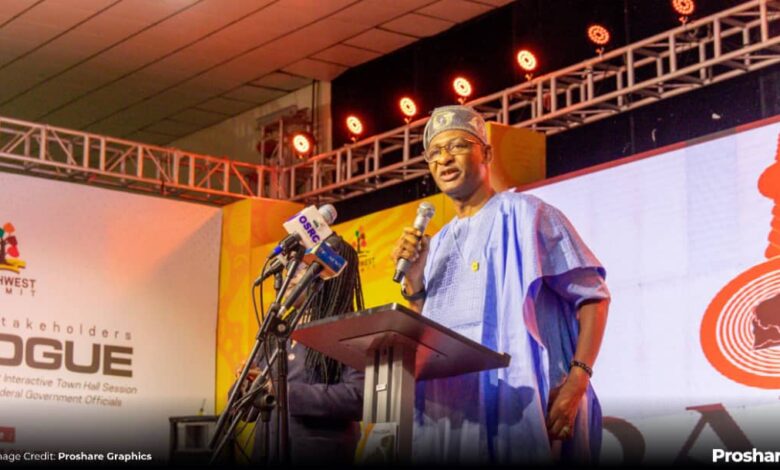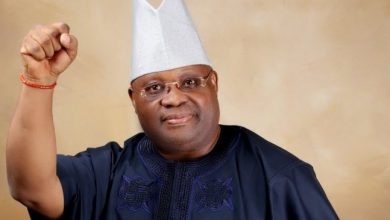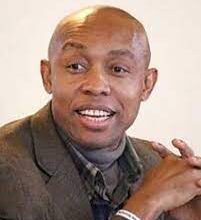Southwest Nigeria – Leading Without Fear, Building Without Constraint

Being a keynote address by Mr Olufemi Awoyemi, mni, at the Southwest Development Commission (SWDC) and Southwest Private Sector Roundtable, themed ‘Towards a Shared Regional Development Compact’, delivered on Wednesday, October 29, 2025, at The International Conference Centre (The Dome), Akure, Ondo State.
Your Excellency, Governor Lucky Aiyedatiwa, our Chief Host;
Your Excellencies, the Executive Governors of Lagos, Ogun, Oyo, Osun, and Ekiti States;
Distinguished Senators, Honourable Representatives of the National Assembly,
Our revered Royal Fathers;
Captains of Industry;
Esteemed public office holders past and present,
Respected leaders of our vibrant civil society;
Distinguished guests,
Gentlemen of the press,
Fellow Southwest citizens – ladies and gentlemen.
“Reform may be painful, but it is what greatness, and the future require.” – Bola Ahmed Tinubu, during his 63rd Independence Day broadcast on October 1, 2023.
Strengthening democracy through agile governance by developing a southwest region that has never been afraid to lead, never been afraid to work hard, and never been shy of pursuing policies, plans, and programmes that create a better tomorrow, despite constraints, is long overdue.
Indeed, Southwest Nigeria has been at the forefront of the country’s progressive thrust, long before the First Republic and to the present day. The region has consistently set the pace for development, innovation, and visionary governance.
The question before us today is not whether we can lead, but whether we dare to lead the building of regional economies that would serve as an exemplar of nation-building.
Over the next 2 days, we will review the place of the Southwest within the Nigerian state under the President Tinubu administration—assessing progress and charting the future. This must be conducted with a sense of history, emboldened beyond politics, focused on the citizens, and with legacy in mind.
The goal must be to move from tokenism masquerading as governance to building agile governance in the region to support the well-intentioned reforms underway.
This is my truth, and I take full responsibility for it.
Contextual Insight – The State of Play
Today, Nigeria has navigated a period of intense risk since the President Tinubu administration assumed office in May 2023. Some hits and unintended errors have marked the transition period, but as 2025 winds down, key indicators suggest the nation has pivoted from a ‘risk watch‘ to a ‘recovery watch’.
With the bold reforms and successful policy interventions undertaken, by the Tinubu government, the administrationhas steered the economy towards a recovery – and Nigeria’s recent removal from the list of countries under increased financial monitoring, commonly referred to as the “grey list” by the global Financial Action Task Force (FATF) provides a further reference point to how far we have come from despondency to definite expectation.
The data explicitly indicate that this is the first time Nigeria will recover from an economic crisis without a global fiscal respite, and that this recovery is not premised on luck but predicated on policy, not default but by design.
Let me present the data literally, but more importantly, focus on the realities of our macroeconomic progress, which has now added growth acceleration to the economic recovery list with the 4.2% GDP growth rate announced in Q2 2025.
The government’s medium-term target of 7 per cent growth by 2027/28 points to an impressive economic trajectory we can build on. A more ambitious goal, however, would be a double-digit GDP growth rate to support a US$1 trillion by 2030—between 10% and 12% per annum over the next five years.
We can take comfort in knowing that the developments we have seen are not subsidised growth and are therefore sustainable, as market-based reforms drive them. Sectoral, regional, subnational, and corporate actors are now better positioned to stimulate growth than during the challenging conditions of the past years.
Curiously, we live in a tale of two economies. There is the statistical economy and there is the street economy.
To bridge these two economies — the transmission and translation gaps between macroeconomics and microeconomics — will require tweaks without compromising the endgame: delivering the much-needed respite, relief, and renewal for the common denominator in the economy, the household, which has borne the brunt of the reforms.
These households, despite the challenges they have faced, recognise that the reforms were necessary. Having navigated the critical phase of the reform process, they are eager to see improvements in their lives and livelihoods. They hope for the prosperity that I believe the Tinubu government is also striving to achieve.
“Reform may be painful, but it is what greatness, and the future require”.
This was the promise President Bola Ahmed Tinubu gave during his 63rd Independence Day broadcast on October 1, 2023. He made this statement to explain the hardships that accompanied his economic reforms, urging Nigerians to endure them for the sake of a more prosperous future.
On the street, for millions of our people, reality is still one of distortions and dislocations. Even with the new minimum wage, average workers’ purchasing power has declined by at least 34% in real terms. This is not an abstraction. This is the lived reality of hundreds of thousands of families across our region.
Bridging the gap will require the administration to be decisive, as it was with the removal of the twin subsidies on premium motor spirit (PMS) and foreign exchange (FX).
To support and sustain this recovery, a key focus of economic management must now be the fiscal and foreign investment reforms, which remain as challenging as they were before the Tinubu administration took over in May 2023
Two significant issues stand out:
1. Fiscal Management – The hallmark of the Tinubu macroeconomic management is a two-sided coin. On one side, President Tinubu achieved foreign reserve adequacy (net reserves).
By contrast, the administration lacks adequate revenue, leaving it reliant on borrowed funds to finance government and the attendant interest burden.
This lack of revenue adequacy will undermine the cost-reflective reforms undertaken if action is not taken. We must therefore reimagine our sovereign revenue model.
2. Foreign Investment Management – The fiscal conundrum described above is the flip side of the revenue crisis. It is worth noting that the old model built around procurements off borrowed funds (a control issue) is unsustainable. It obstructs and obfuscates investment decisions and is directly at odds with a market-led approach.
By 2027/28, the Tinubu administration will be expected to move towards a market-centric model that deploys a deal-book approach to funding infrastructure/capital projects, using market-based plans for which the Ministry of Finance Incorporated (MOFI) was created.
Nigeria must be intentional about halting the fulfilment of investments through budgetary allocations and borrowing.
We should get out of the way of investors to allow governance to become more agile, effective, and efficient.

Doubling Down on Reforms and the Plumbing Required by the Southwest
While I acknowledge that hope is a helpful tool for collective aspiration and inspiration, it is not a method.
We cannot hope for growth and development; we must plan for it. Marion Bekoe says, “To see changes, make changes. If not, expect nothing to change”.
We must treat Southwestern Nigeria as a sovereign state – change the performance measurement markers and build the capacity to deploy them.
Luckily, we will not be starting from scratch.
What is now required is for the Southwest region to become more strategic in its ecopolitics.
The recovery we see from the Tinubu administration is akin to a ‘baby bump‘ noticeable during the first trimester, which needs to be nurtured through to delivery – the recovery stage, and will take some years to see through its trimester, so that we do not risk a miscarriage.
If we agree, the mindset shift in the southwest must equate what Noam Chomsky alluded to when he said, “There are no poor countries, only failed systems of resource management.”
Now, we must learn to walk away from memory and step into our imagination so we can redirect the southwest region as a worthy example of regional development.
Shimon Peres, in the book ‘Start-Up Nation,’ succinctly describes this shift when he says, “People prefer remembering to imagining.” Memory deals with familiar things; imagination deals with the unknown. Imagination can be frightening – it requires risking a departure from the familiar“
This summit must not be scared to reimagine governance.
Memory Jogger – The Southwest’s Future-Ready Mindset
Remember, we are a region of many firsts:
- first region in Africa to launch a television station, WNTV, in 1959.
- first to implement free universal primary education. Most of us here today are beneficiaries of this forward-thinking investment.
- pioneered urban planning in Ibadan, Lagos, and Abeokuta.
- pioneered the development of industrial estates through the Western Nigeria Development Corporation (WNDC)
- built Liberty Stadium, the first of its kind in West Africa at the time.
- created the Odua Investment Company as a regional economic powerhouse that still holds assets across various Southwestern states.
- led in infrastructure financing, regional integration, and public service professionalism.
These developments were not accidents. They were the result of clear vision, strategic investment, and fearless leadership.
Today, citizens are demanding opportunity, relevance, and dignity. Governance has to evolve to meet these challenges without hesitation or fear.
Hitherto, whilst the rhetoric was that Nigeria is a private sector-led economy, the truth of the matter is that the government was too dominant in the economic sphere. The direct consequence of this is that the innovative spirit that should foster efficient and effective service delivery was not allowed to thrive.
Today, we can see the multiplier effect of a Dangote Refinery vs an NNPC Refinery.
It comes down to leadership.
In the governance equation, in which the private sector is highly relevant, the Tinubu government is now adopting policies that meet the criteria for innovation.
Nigeria today is now addressing the conundrum of good Intentions and bad politics, and the populace is yet to grasp that concept (because even those in government are only now coming to terms with it).
We have perpetuated this for so long that it has stifled the sub-nationals and, by extension, the regions from stepping beyond their constraints into their purpose.
That is now the next level of challenge for regional leaders.
A regional development compact, therefore, must seek to leverage the state’s and, indeed, the region’s assets using a market-determined model to fund capital projects.
The Southwest Nation We Deserve
The Southwest, like Nigeria, is at the factor-driven stage of development, relying mainly on natural resources and unskilled labour. We must move from the investment-driven stage to the innovation and knowledge-driven economy. This requires us to get ready for the mud, the grime, and the sweat of industry, organisation, and processes.
Innovative governance in the Southwest is NOT about tokenism or converting the SWDC into a constituency project awarding entity. It is not about road repairs, water projects, or building market stalls. It is a new way of thinking. It is about models and templates for driving excellence.
It must be catalytic in mobilising change and exploring new partnerships with business and citizens.
Innovative governance shifts public institutions from Rule-Driven Government to Mission-Driven Government, injecting competition, collaboration, and coordination into public service delivery.
Southwest Nigeria’s GDP is roughly equivalent to Ghana’s and larger than those of many mid-tier African economies, such as Senegal, Uganda, or Zambia.
Key Drivers of Southwest Nigeria’s GDP
- Lagos State alone contributes over $50 billion, driven by finance, trade, ICT, and logistics.
- Oyo, Ogun, and Ondo add significant value through agriculture, manufacturing, and services.
- The region benefits from strong infrastructure, urbanisation, and the private sector.
The Imperatives for the Southwest
The Southwest region has been handed a vehicle for change within the constitutional framework – the mandate of the Southwest Development Commission (SWDC) is to drive sustainable development, economic growth, and regional integration across the six states of the Southwest by coordinating projects and fostering investments in infrastructure, industrialisation, human capital, and poverty reduction. Its goal is to transform the region into a globally competitive economic bloc.
If this significant vehicle by the Tinubu administration is appropriately understood, the summit must do a few things.
It must review the joint infrastructural initiatives that can transform the region into a cohesive economic powerhouse.
Based on the 2025 budget analysis by the DAWN Commission and current development trends, here are some high-impact projects that could be executed collaboratively:
1. Regional Rail Network
• Goal: Connect Lagos to Ibadan, Abeokuta, Akure, Ado-Ekiti, and Oshogbo via high-speed rail.
2. Integrated Power Grid & Renewable Energy Hubs
• Goal: Build solar farms and mini-grids across Ondo, Ekiti, and Osun.
3. Southwest Agro-Industrial Corridor
• Goal: Link agricultural belts in Oyo, Ogun, and Ekiti to processing hubs and export terminals.
4. Regional Airport Network
• Goal: Upgrade Akure, Ibadan, Gateway and Ado-Ekiti Airports to handle cargo and regional flights.
5. Digital Infrastructure Backbone
• Goal: Lay fibre-optic cables across all six states for high-speed internet.
6. Waste-to-Energy & Environmental Management Systems
• Goal: Build regional recycling and waste-to-energy plants.
7. Unified Land Registry & GIS Mapping
• Goal: Digitise land records across all states for transparency and investment; reduce land disputes, improve planning, and attract investors.
The Southwest must pool resources for mega projects (estimated ₦6.6 trillion regional budget) and secure legislative alignment by harmonising laws across states for land, transport, and investment.
Easier said than done, you might respond?
The Southwest cannot afford to play checkers when cities like Dubai, Dublin, Durban, and Cairo play chess.
It should compete with successful economies, not play small. That is what bold leadership requires.
As I round off,
This summit must set the ball rolling on a well-designed, thoughtfully crafted roadmap for the region’s development over the next five years, with assigned projects, programmes, precise target dates, and performance milestones.
These are no longer desirables; they are imperatives.
Other regions are taking these matters seriously and are building capacity to reform their regions, including raising multi-billion-dollar pledges to fund a comprehensive regional development masterplan.
The Southwest must not only remember its legacy of pacesetting, but it must also institutionalise it.
It must start by marshaling its institutional advantage to integrate the region’s plans within the nation’s agenda.
As the Federal Government prepares the next Medium-Term National Development Plan (MTNDP) for 2026-2031, the Southwest must not be a mere participant, but an active facilitator of an integrated plan with a regional execution bias, building on our unique competitive advantages.
This will be delivered through the plumbing work that will take place to align policy, project and principles for a southwest agenda/plan delivered through a collaborative but process-driven SWDC having vertical and horizontal alignment with the Development Agenda for Western Nigeria (DAWN) Commission, which has been operational since 2013, the Odu’a Investment Company, established in 1976, along with other relevant structures.
I have a lot more to say on the subject, but I must not abuse the courtesy extended to me. That, after all, is what integrity-based conduct is all about.
On this note, I pause and bring this address to a close, doing so with the following saying: “Idera ti fe de, E je ka fi imo so’kan!”
Ladies and Gentlemen, I thank you for your kind attention and patience.
Olufemi M. AWOYEMI, FCA, FCTI, FCIB, F.CIoD, FIIM, FERM, FICA, FIAPM, ACS, mni
Chairman/Founder Proshare LLC
About the AUTHOR
Olufemi M. AWOYEMIFCA, FCTI, FCIB, F.CIoD, FIIM, FERM, FICA, FIAPM, ACS, mni is the founder of Proshare LLC, Nigeria’s leading financial information hub. He holds several memberships and fellowships with various professional bodies. With a distinguished career spanning close to four decades, Olufemi has built expertise in business strategy and governance and is highly regarded for credibility-driven interventions in economic intelligence, market governance and public policy. He has worked with reputable and leading corporate entities.
Olufemi is currently a Governing Council Member and Vice President of the Association of the Investment Advisers & Portfolio Managers (IAPM), Trustee of the African Fintech Network (AFN), Governing Council member of the Association of Corporate and Individual Investment Advisers (CIIA), Executive Council member of the Nigerian British Chamber of Commerce (NBCC), member of the CIBN’s Business and Government Relations Committee, member of the Advisory Board of FITC Sustainability ESG Institute, Co-Chair of the Policy, Strategy and Innovation Committee of the Alumni Association of the National Institute (AANI), and Secretary-General of its Lagos Chapter. You can follow him on X or email him at ceo@proshare.co




